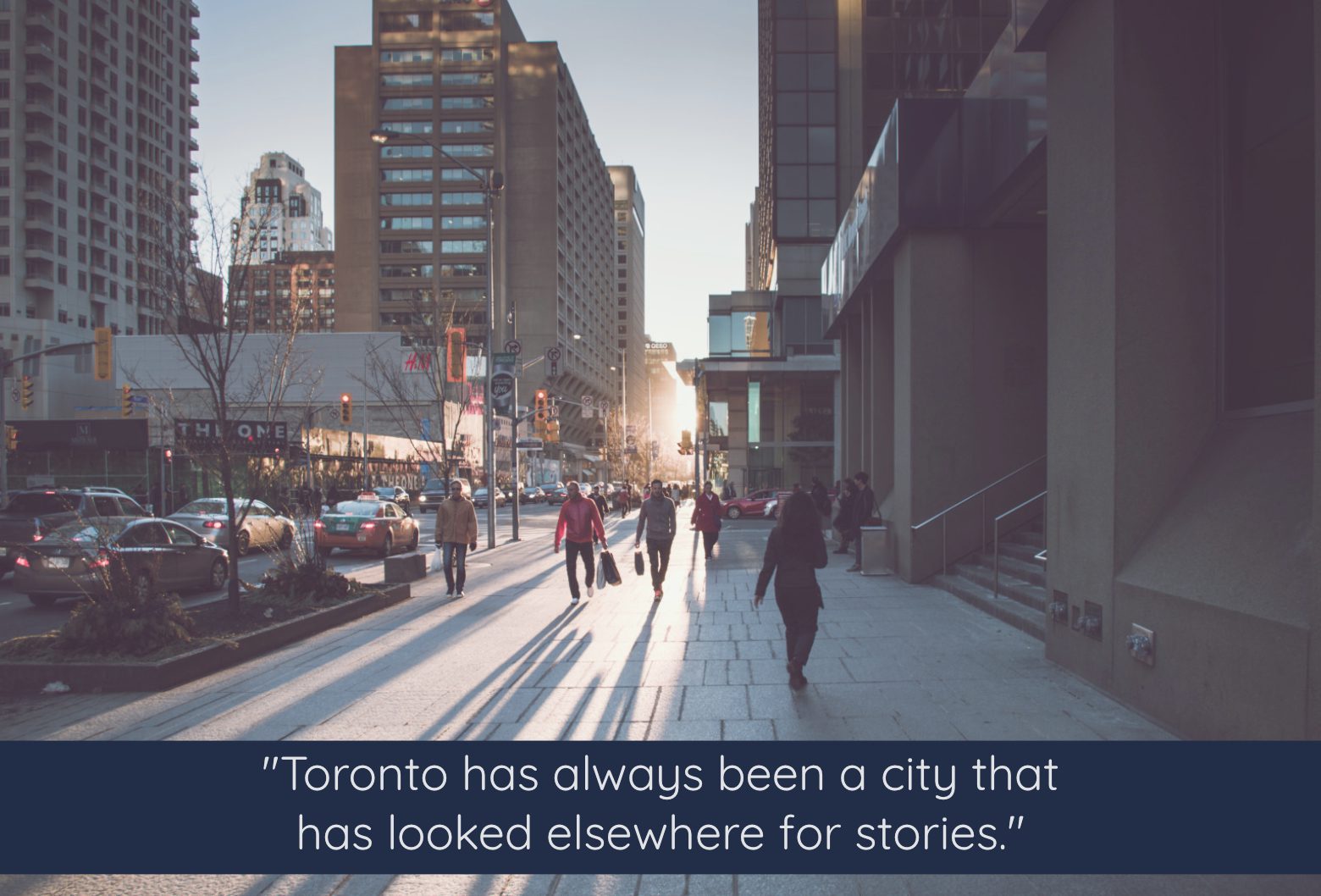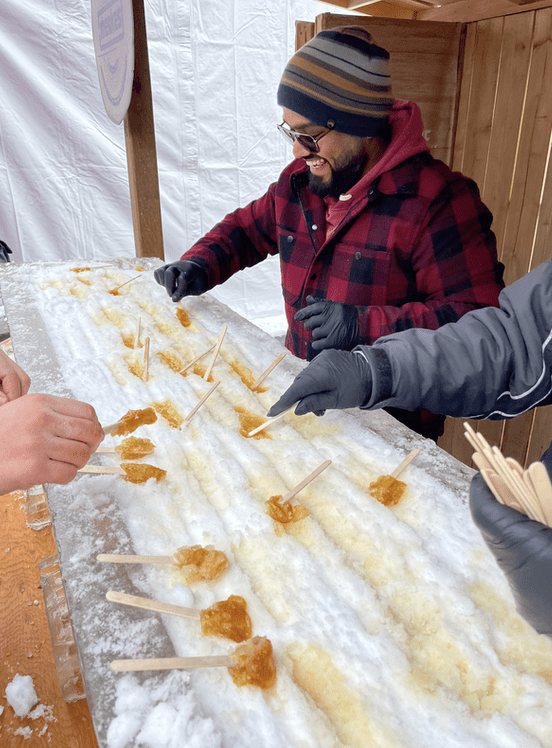It was incredibly appropriate that when I called to interview him, Shawn Micallef – journalist, author, university lecturer, and perpetual pedestrian explorer of Toronto – was about to head out for a walk.
Wandering around Toronto’s byways is, after all, one of the things that Micallef is known for; since he moved here in 2000, he has walked the city, tweeted about the city, and written about it extensively in his weekly column for the Toronto Star. Three of Micallef’s four published books – Stroll: Psychogeographical Walking Tours of Toronto, Full Frontal TO, and just this year, Frontier City: Toronto on the Verge of Greatness – are meditations on aspects of Toronto, while their author is both a co-owner and senior editor at the city-centred Spacing Magazine.
Shawn teaches at the University of Toronto and OCAD University. In 2002 he co-founded [murmur], the location-based mobile phone documentary project that has spread to over 20 cities globally.
Follow him on Twitter.
You’ve been referred to as a modern flâneur– a term usually associated with 19th-century gentlemen leisurely strolling the streets of Paris. What do you think of the title?
“It’s a funny word because maybe it’s not something you want to put on your resume. It’s about being idle and being a bit of a professional loafer, lingering around cities, and just sort of observing; slowing down and watching, being a part of the crowd, but not lost in it.
The way I think of it is, a flâneur wanders through the crowd – you’re part of it, you’re overhearing it, but you always have your mind’s eye floating up high above. You’re watching how you and the crowd kind of all interact together. It’s a good position to be in as a writer.”
Have you always been interested in how cities work?
“I think so. I grew up in Windsor, and we looked across the river to Detroit – a fascinating place. We had kind of this front-row view for the decline of Detroit. I was a kid of the 70s, growing up in the 80s watching it kind of bottom out, and then sort of rebound, as it has in the last few years. Once I was old enough to drive and in university, we would go to Detroit weekly.
But then I always wanted to move to our city, the Canadian city of the 401, which is Toronto. I always had this kind of mild Toronto obsession. I think it was because of growing up in a small city –which I’m very fond of – and looking at these bigger cities; Detroit across the lake, kind of collapsing and decaying, and Toronto, which was sort of the opposite of that. It was growing kind of like a circuit board when you come in on the Gardiner Expressway. Things are going up all the time. I think being not-from-a-big city has made me fascinated with big cities.”
Your latest book is called Frontier City: Toronto on the Verge of Greatness. What is this greatness, and how do we go about achieving it?
“Well, all the ingredients are here, right? It’s a prosperous city, especially if you live in and around downtown, with skyscrapers going up everywhere, and these neighbourhoods that are beloved and constantly being written about – you know, like, the New York Times, the Guardian, ‘Coolest Neighbourhoods’: the Junction, Queen West, Leslieville, etcetera. So if you live in it, you get to see quite a great place.
But as I talk about in the book, the upshot of going through the Rob Ford years and beyond is that we’re reminded, or just schooled, in the fact that there are vast amounts of Toronto that felt left out of that prosperity, and they didn’t get to experience the kind of joy of Toronto. Instead, there’s the idea that living in the city is a chore, and it’s hard to make it here, increasingly for them, and the inequality of cities is increasing as multiple studies are showing.
And if we don’t get on that, if we don’t figure that out, a populist politician like Rob Ford can easily be elected again, and the greatness – the things I love about living in this city, and a lot of people love, the stuff we’ve often written about in Spacing magazine – won’t be available to an increasing number of people.
So that is, I think, the greatness. If we don’t bring this great joy of living in Toronto to everyone or make it available to everyone, it will be thwarted.”
What are some of the joys of living in Toronto?
“I think part of it is that you can get to the country. I live near Yonge and Bloor, and within ten minutes I can go for a run and be in the ravines and run into deer and coyote, and then ten minutes later I’m back up on Yonge street at a Starbucks, post run. I think one of the great things about Toronto that so many other cities wish they had is just the benefit of the geography of blending wilderness, or quasi-wilderness in with the city.
The ravine network goes all the way out to the far suburbs, and that proximity is really wonderful. And the fact that the city that’s often adjacent to the ravines is kind of everything you want in a city at first blush.
And then, you know the mixed, communities; people can do everything that they need to do within their own neighbourhoods – it’s a city of neighbourhoods, as has been celebrated. But also just the people that are here, and the people that are coming to the place create a culture that is exciting. You can always find something to do. You can find your niche, your subculture.”
Going back to your book, didn’t the idea for Frontier City spring from the last two municipal elections?
“It was kind of pitched to me by the publisher at the height of the Rob Ford trauma in 2014, soon after he appeared on Jimmy Kimmel. It was like this international thing. They [the publishers] thought ‘we could do a book about this’.
And as I started it became apparent that the details of Rob Ford were all being told – we know it, right? We know the salacious details. So the more interesting, compelling story seemed to be ‘Why?’ What was it about this city that – it’s a learned city; four universities and many other colleges, endless studies and reports and books about the city – a smart place, and yet it elected this guy.
That’s where the thing kind of shifted from being an of-the-moment book about Rob Ford to trying to figure out an understanding of the people and geography of this place.”
But what is the frontier in the book’s title?
“I think the frontier can be interpreted in a couple ways. Maybe it’s downtown and suburb – which was such a wedge issue during the Ford years (and maybe even now) – but also just the frontier between Toronto being a city that happened somewhat accidentally, despite itself. It was never supposed to be a great city.
Montreal was Canada’s great city. And you walk through Montreal and you can see these grand buildings, whereas if you walk in Toronto we’ve got good buildings, but also kind of a sense of suburban-ness, shabbiness, often built on the cheap.
So the frontier is that the city is, maybe, a teenager. Sometimes it’s awkward, sometimes it acts out and you don’t want to see it, but its potential is all there, and the future – if it gets it right, if it gets into the right school – it’ll be a great future. But teenage years – frontier years – are incredibly thrilling. We’re lucky to live in them, but maybe we don’t want to repeat them.”
Now that you mentioned grand architecture, your writing often seems to be infused with a sense of history, or even myth. Is this intentional?
“Yeah, I totally try to sneak history in. The other things I try to sneak in are social justice issues if it’s a fun column, or like, a happier column. Sometimes it’s architectural appreciation. I don’t write straight-up architecture columns, but I try to sneak them in so people who think they don’t care about architecture and never thought about it might kind of come around to it. So there’s a certain sneakiness I think, in all of this kind of writing.
Why are you sneaking this stuff into your writing? What’s the point?
“Because if people don’t have this kind of founding idea of themselves, they won’t care about the place. Toronto has always been a city that has looked elsewhere for stories. You walk around the city and everything’s named after some dead British guy. Maybe a couple Irish guys too.
I’m walking on Richmond street – I think it’s named after the Duke of Richmond. There’s Queen’s Park. King street. Queen street. All these references to take people out of the local and to someplace else. And we’ve sort of become this de facto colony of America, looking to the south.
Think of all the movies we shoot here, and Toronto never gets to play itself; it’s always playing New York or Chicago or some other city. Whereas New Yorkers have this innate sense of themselves. Even my mom in Windsor – if I said something like ‘the Lower East Side of Manhattan’ I think she would kind of have an idea that that’s where punk rock came from. Even though my mom is not into Punk Rock at all. Right? The mythology of it kind of comes out.
Whereas Toronto – and probably Canadians in general – we have not been good at telling our urban stories. The stories inform who we are, so we haven’t had that kind of base knowledge of ourselves. Which leads to not appreciating the city, and overlooking the great things that we have here.”
This reminds me a bit of [murmur], the urban oral history project you did back in 2002.
“Yeah, that WAS basically the motivation for doing [murmur]. It’s having small stories, instead of grand narratives such as the Leafs winning in 1893 – or whenever the last time they won. It’s small, everyday stories pulled from non-professional storytellers.
It would be like walking down the street with your uncle who lived in Toronto. You’re visiting your uncle in Toronto and he tells you about his Toronto. Sometimes it’s personal history and sometimes it’s the city’s history that he knows, but always sort of on this personal level.
And I just wanted to trickle those out onto the streets of Toronto as a way of helping along the founding mythology of the city. And making it more complex. Sometimes the story of Toronto – the official story – tended to be a little more white, a little more British and queen and king and that sort of thing, when there are a lot of sub-stories that are part of that, but different. I wanted people to learn those sub-stories as well, which was the point of [murmur].”
In addition to your books, projects and running an online magazine, you’re also teaching some classes at the University of Toronto? What kind of classes?
“I teach one course at U of T all year called Citizenship and the Canadian City, and one I was marking this morning called Blogging the Just City. It’s getting students to write about Toronto but through a social justice lens. So, homelessness, inequality, untold history. Unrepresented history is one of the things we talk about. Whose history gets told in Toronto, and whose doesn’t?”
And what do you teach in the Citizenship and the Canadian city class?
“This is a class about city citizenship, so it’s not national citizenship – it’s not like, getting a passport or swearing allegiance to the crown, or the Queen, or whatever. What are the obligations of a person living in a city? Do you have to love the city? Should you hold a door open for people? Should you stoop and scoop if you have a dog? Kind of everyday things.
It’s a citizenship of the everyday, and a commitment to the place you live in, to do whatever you can to make it a little better. It’s a big, broad umbrella, but I try to discuss that throughout – when we talk about the problems, and the great glory of living in a city.
What can people give back to it, in various different ways? I don’t want students to do what I did – I was oblivious to the city for so long. I want them to think that they CAN make this place better.”
[fvplayer src=”https://www.youtube.com/watch?v=b6wEHg0fwHo” width=”625″ height=”300″ align=”left” caption=”Shawn Micallef at TedEX Toronto” splash=”https://i.ytimg.com/vi/b6wEHg0fwHo/maxresdefault.jpg”]
Any idea what’s next for you?
“A project about Canadian cities, talking about ‘is there a Canadian urbanism?’ Is there something about Canadian cities which seem by-and-large successful (although many cities are experiencing the same kind of inequality and pressures that Toronto has and Rob Ford could be elected in any of them)? So maybe there’s something worth sharing, something worth talking about.
But also, I wonder if talking about Canadian cities – getting Canadians to think about themselves as city dwellers, because 80 percent of us live in cities – maybe that might overcome some of the regionalism that Canada’s been plagued with. You know, East vs. West, and that sort of thing.
And none of this has to be at odds with the countryside. I think town and country need each other – sometimes that relationship is a bit thrown out of whack, but I think getting excited about beyond Toronto is what I’m looking forward to next.”
JN00ML







